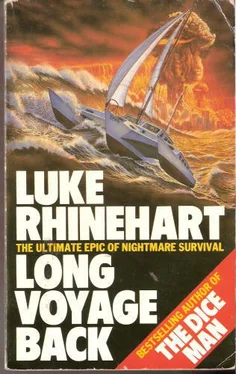Luke Rhinehart - Long Voyage Back
Здесь есть возможность читать онлайн «Luke Rhinehart - Long Voyage Back» весь текст электронной книги совершенно бесплатно (целиком полную версию без сокращений). В некоторых случаях можно слушать аудио, скачать через торрент в формате fb2 и присутствует краткое содержание. Город: New York, Год выпуска: 1983, ISBN: 1983, Издательство: Delacorte Press, Жанр: sf_postapocalyptic, на английском языке. Описание произведения, (предисловие) а так же отзывы посетителей доступны на портале библиотеки ЛибКат.
- Название:Long Voyage Back
- Автор:
- Издательство:Delacorte Press
- Жанр:
- Год:1983
- Город:New York
- ISBN:0-440-04617-3
- Рейтинг книги:4 / 5. Голосов: 1
-
Избранное:Добавить в избранное
- Отзывы:
-
Ваша оценка:
- 80
- 1
- 2
- 3
- 4
- 5
Long Voyage Back: краткое содержание, описание и аннотация
Предлагаем к чтению аннотацию, описание, краткое содержание или предисловие (зависит от того, что написал сам автор книги «Long Voyage Back»). Если вы не нашли необходимую информацию о книге — напишите в комментариях, мы постараемся отыскать её.
Long Voyage Back — читать онлайн бесплатно полную книгу (весь текст) целиком
Ниже представлен текст книги, разбитый по страницам. Система сохранения места последней прочитанной страницы, позволяет с удобством читать онлайн бесплатно книгу «Long Voyage Back», без необходимости каждый раз заново искать на чём Вы остановились. Поставьте закладку, и сможете в любой момент перейти на страницу, на которой закончили чтение.
Интервал:
Закладка:
The strangeness of their clothing was only another symptom of their dissociation from their previous lives. Just as they were physically, electronically, and geographically isolated from most of the rest of the planet, so too they were now in some way detached from the incredible events that had transformed the earth. The fear and hatred that the inhabitants of the Southern Hemisphere felt for refugees like themselves seemed to be natural and as blameless as the squalls that had afflicted them north of the equator—something to reef for. The destruction of much of the world by nuclear war seemed like a natural tragedy, as if the earth had been hit by some errant comet.
The plague did not reappear. After two weeks they dared to assume that they were free of that danger. They were healthy. They were starving. Bringing in a single fish was cause for a major celebration. The loss of a hooked fish before they had boarded it left them limp, empty, afraid. When their emergency cache of food was mostly gone, when they were down to a few days’ ration of dried fish, when all their previous stores of food were reduced to a few rotting potatoes and the last unopened, rusted can of Spam, they turned, filled with dread, again toward land.
Their lives, which for three weeks had taken on a peaceful, dreamlike quality brought about by their isolation and undernourishment, now, they feared, would once again take on the quality of a nightmare. They approached land feeling like aliens about to visit a foreign planet.
But the land came out to them. An Argentine frigate met them thirty miles off the coast and warned them through an electric bullhorn that no Norteamericanos were being allowed on the mainland of Argentina. If they came any closer to the coast their boat would be confiscated and they would be taken to the recently conquered Malvinas Islands with the other plague victims and illegal immigrants. They turned back out to sea.
Now sailing south seemed like an act of madness. They were sailing into winter, down toward the fiercest winds in the world, to the Straits of Magellan, to Cape Horn. They were sailing down to the very bottom of the civilized world, to a land so barren and infertile only the simplest and most impoverished Indian cultures had inhabited it until barely a century before. They were sailing away from man.
They had decided to try to sail through the Straits of Magellan to the Pacific. This proposal, which would have seemed so absurd, so impossible, two months before, seemed to all of them now to be inevitable and necessary. They had been driven south by forces beyond their control. Every time they had stopped running and tried to settle, they had been driven onward. Although the rest of the planet was silent now, all their radios silent, they sensed that where men were few and far from the holocaust, there peace might be found. To get to the islands of the South Pacific, they would have to round the tip of South America. So they would round it.
Strangely, even as they were turned away from land, the sea began again to feed them. They caught two large tuna, thirty pounds between them, at dusk of the very day they had been repulsed. They decided now to hold none of this blessing back, because they knew that all of them were near the end of their tethers. They decided to eat as if there were no tomorrow. “The Good Lord will provide,” Olly pronounced. “Occasionally.”
Watches had to be shortened to two hours, sometimes only one, because no one had the strength to stay at the helm any longer. Each person slept most of the time they weren’t needed in sailing the boat. Carpets, life preservers, and unused sails were used as extra blankets. As they moved farther south the seas grew bigger, the winds fierce. Neil, fighting to bring down the mainsail in sudden forty-knot winds, wrenched his back, sending it into spasms and effectively incapacitating him.
As the cold became worse and the work even more demanding Olly too took to bed. After standing his watch one morning he staggered down into the main cabin and fainted. Later, revived, he announced he was “feeling poorly” and would prefer a vacation. With Neil already bedridden, Olly’s dereliction made everyone realize how frail and bony he had become—a laughing skeleton, Philip had called him a few days earlier. He had a slight fever, complained of pains in his chest and belly, complained of a toothache, but what really ailed him couldn’t be pinned down. His illness left Jim and the two women to sail Vagabond alone. Thus now Jeanne and Sheila each had to take two-hour shifts at the helm alone in thirty- to forty-knot winds. And Vagabond, scarred and jury-rigged, as tired in her bones as her sailors in theirs, slashed and pounded dutifully forward, her sails tearing more often, fittings coming loose, but still going forward.
When they finally arrived at Cabo Virgenes at the eastern end of the Straits, they arrived, as Philip had predicted, in a gale. It blew out their working jib; they lost a halyard up the mast; they were almost blown onto a rocky shore before they regained control and retreated back out of the Strait to anchor in the lee of a point.
They had to remain anchored there for four days, waiting for the gale to blow itself out. They mended sail, caught a half-dozen small tasty fish on the bottom, and rested. They sent a party ashore to search for food. The shore was barren, windswept, all in gray and brown. They felt immense relief that there were no humans in the area. The late winter-early spring season meant that there was no green vegetation except in the water. They plucked at the few dried berries they found as at the most luscious of strawberries; dried grasses were picked to be their lettuce. Seaweed and shellfish were gathered from the tidal pools. Thankful for these meager winter remnants, the party returned to Vagabond to rest, Olly joining the Wellingtons to conserve body warmth in the aft cabin.
Neil, although still bedridden and frustrated by being unable to share in the sailing, nevertheless found himself strangely content. Instead of feeling alone and isolated, he felt as if he were at home surrounded by a loving family. Jeanne had sawed a hole in the wall separating their cabin from the main cabin so he was able to talk to the others. He had once or twice tried shouting orders from his bunk, but even as he did he realized his contributions weren’t needed. Philip and Sheila and Jim were all good sailors. Instead of making him feel unneeded, this awareness of his own superfluity was soothing. He could lie in his berth without the sense that unless he got himself up on deck in the bitter cold, Vagabond was doomed. The only thing that occasionally frightened him about his contentment was that it might be a sign that he was dying.
His own survival had given him hope for the group as well. He felt that down so far at the bottom of the world the disease called man might have escaped the fear and violence that was destroying the more civilized strains up north. Ultimately, he supposed, his feeling that they were going to make it was as absurd and groundless as his and Jeanne’s earlier conviction that they were doomed. Deep down he knew that even now, after all they had been through, Death could squash them all effortlessly with one casual blow.
Yet, for now, they still lived, and despite the hardships, they found in the tiny haven of their cabin a quiet and confident happiness that had always eluded Neil.
Life was reduced to eating, keeping warm, and companionship. The violent conflicts that wracked the rest of mankind seemed distant and trivial. A conversation between Neil and Jeanne one afternoon when Vagabond was at anchor, riding out the snow squalls and forty-knot winds, showed how detached they had become from their previous world. They were lying under a pile of covers in their berth.
Читать дальшеИнтервал:
Закладка:
Похожие книги на «Long Voyage Back»
Представляем Вашему вниманию похожие книги на «Long Voyage Back» списком для выбора. Мы отобрали схожую по названию и смыслу литературу в надежде предоставить читателям больше вариантов отыскать новые, интересные, ещё непрочитанные произведения.
Обсуждение, отзывы о книге «Long Voyage Back» и просто собственные мнения читателей. Оставьте ваши комментарии, напишите, что Вы думаете о произведении, его смысле или главных героях. Укажите что конкретно понравилось, а что нет, и почему Вы так считаете.












